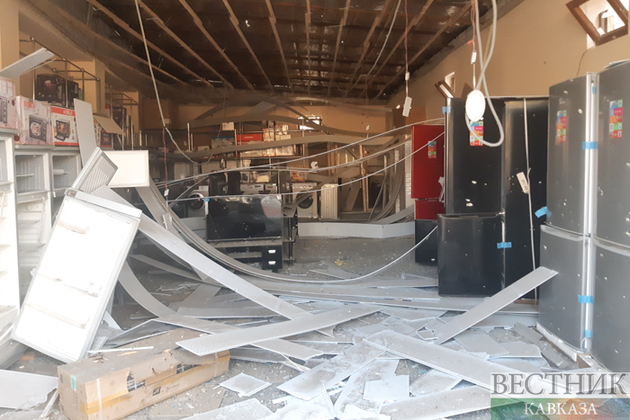On November 11, a day after he signed the trilateral accord with Russia’s President Vladimir Putin and Armenia’s Prime Minister Nikol Pashinyan ending the Second Karabakh War, President Ilham Aliyev of Azerbaijan declared that “almost 99 percent of the liberated territories had been destroyed” (Azernews, November 12), The Jamestown Foundation writes. The termination of the Armenian occupation revealed the enormous extent of the destruction in the territories that once were home to up to a million people. Everything, including residential buildings, schools, hospitals, public buildings, historical sites, graves and mosques had been razed to the ground, President Aliyev added.
Further devastation was carried out recently in Kalbajar and Lachin when the local people, who moved there after the start of the occupation, were informed about the region’s imminent handover to Azerbaijan (Anadoly Agency, November 13). Aliyev has vowed on a number of occasions that the total damage will be calculated and Yerevan will be held accountable before the international courts and compelled to pay compensation. On December 1, in his national address following the handover of the Lachin region to Azerbaijan (in line with article six of the November 9 trilateral ceasefire accord), he stated that “the assessment process will begin soon and the damage will be calculated [with the] participation of international institutions. Steps have already been taken at the legal level,” without disclosing the details of the process (President.az, December 1). Aliyev had earlier declared that Azerbaijan would file lawsuits with international courts—both individually, by the internally displaced persons (IDP) who were directly affected by the occupation, and collectively, at the state level (Azernews, November 12).
Ara Ghazaryan, an Armenian lawyer, believes that Yerevan possesses sufficient legal arguments to counterbalance Baku’s demands for compensation. “Armenia and Artsakh [the Armenian name for separatist Karabakh] may also demand compensation for the bombing of our settlements” and “unleashing of the war” against Armenians on September 27, 2020, Ghazaryan said to a local news outlet (Armenpress, November 27). However, since Karabakh is internationally recognized as part of Azerbaijan, Ghazaryan’s claim may not be as effective as he anticipates.
Gevork Kostanyan, a former prosecutor general of Armenia and former representative of Yerevan at the European Court of Human Rights, is, therefore, not as optimistic as Ghazaryan. He has warned about Azerbaijan’s demands for compensation and called on Pashinyan to resign as well as to invalidate the trilateral ceasefire accord the Armenian leader signed on November 9. “After [Pashinyan’s] signing of the famous statement, a legal basis has emerged for Azerbaijan to file a lawsuit against Armenia demanding compensation,” Kostanyan argued (News.am, November 12; Newarmenia.am, November 21).
Azerbaijan started preparing a lawsuit against Armenia related to compensation for the material damage in the occupied territories as early as two years ago. “They hired an international organization for calculating the damage, which estimated the damage caused to Azerbaijan at more than $50 billion,” Kostanyan said. He added that Baku did not pursue this process any further at that time, as “as they did not have sufficient evidence that the responsible entity was Armenia.” According to the former Armenian official, Yerevan signed the 1994 ceasefire agreement (halting the First Nagorno-Karabakh War) as a guarantor not as a responsible side of the conflict, but this position changed after Pashinyan signed the trilateral statement and accepted obligations to withdraw Armenia’s Armed Forces from the occupied territories of Azerbaijan (News.am, November 26).
Azerbaijan expects that the amount of compensation could be much higher than Kostonyan’s estimation, with expert predictions ranging from $100 billion to $1.3 trillion (Trend, November 18). However, Baku has yet to present a final, official figure; President Aliyev has clarified that it will only be determined following the completion of an appraisal of the damage. It is widely assumed that Armenia, with its struggling economy, will face a monumental challenge to pay any amount of reparations that is calculated in the billions of dollars.
Vugar Bayramov, an Azerbaijani member of parliament, has pointed out that there have been notable cases in recent history of states being forced to pay reparation at the conclusion of interstate wars—for example, the United Nations compelled (Resolution 687) Iraq to pay $52.4 billion in compensation for the latter’s invasion of Kuwait in 1990 (Publika.az, November 13). He added that even very poor countries have paid those compensatory commitments partly or completely, after they were held accountable by international courts. “That is why the fact that Armenia is a poor country does not save it from the liability to recompense the damage its occupation has inflicted on Azerbaijan,” he stressed.
As for the prospects of the legal battles between the two countries in the future, Gevork Kostonyan believes that Yerevan will have no viable defense in the courts. Since Armenia signed the November 9 trilateral agreement, it explicitly acknowledged that it controlled Azerbaijan’s occupied territories during the last three decades, he argued. As a result, Kostonyan continued, “when Azerbaijan files the lawsuit [soon], and not in the amount of $50 billion but even $100 billion, Armenia [will have] no legal grounds against it at the moment” (News.am, November 26). In accordance with the European Court of Human Rights, the 1950 European Convention for the Protection of Human Rights and Freedoms as well as the Geneva Conventions, Armenia may be legally obliged to pay the compensation. However, Azerbaijani lawyer Fuad Aghayev doubts Baku will see the money any time soon, even if it wins the case in court. “Armenia will most likely evade the payment of compensation. And it is too early to go into the details of the implementation of the [legal] decisions,” Aghayev concluded (Az.sputnik.ru, November 23). The costs of rebuilding Karabakh will, thus, likely fall on Azerbaijan for the time being.






